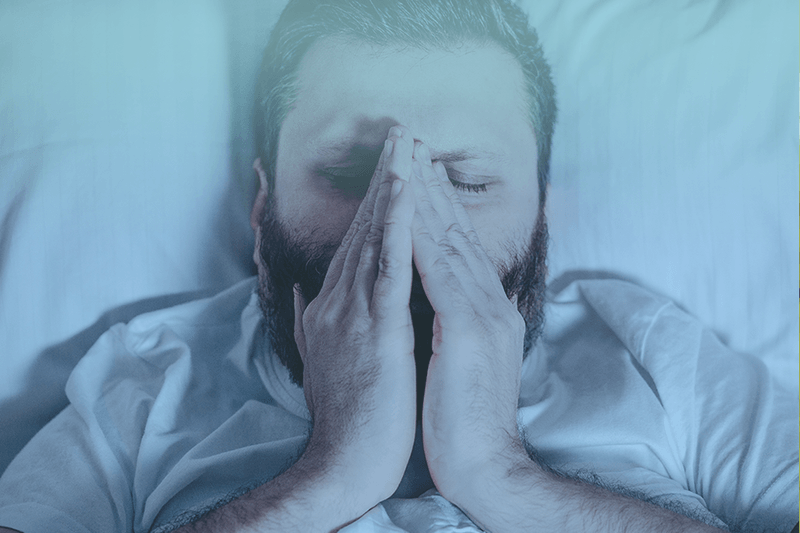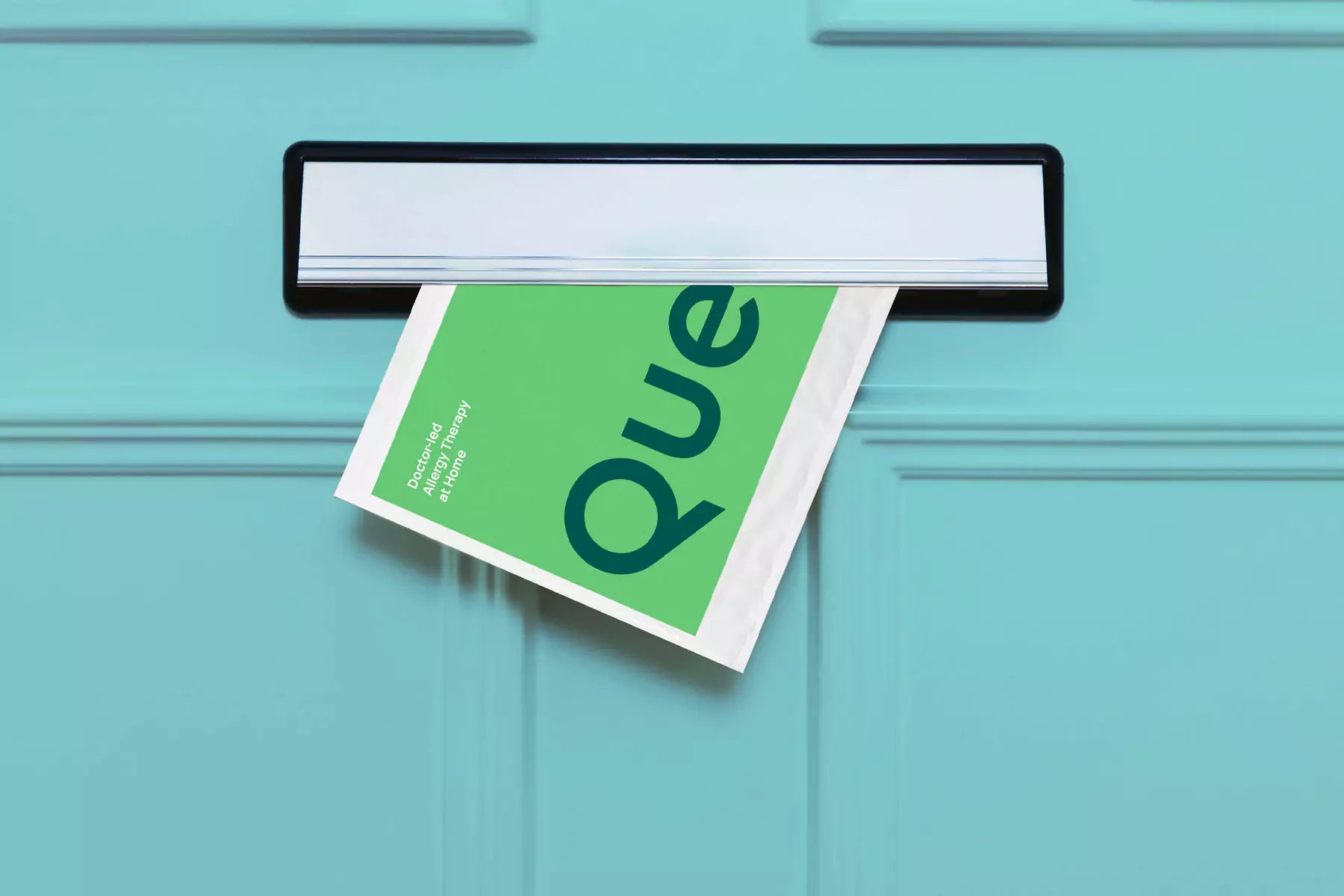Breathe Freely

Why Are My Allergies Worse At Night?
If your allergies flare up at night, you’re not alone: increased exposure to allergens in your bedroom can cause a spike in symptoms. Fortunately, environmental and lifestyle changes can bring you relief.
It’s a frustratingly common story for allergy sufferers. You do all you can to prepare for a great night’s sleep. You drink some chamomile tea, take a bubble bath, get into your comfiest PJs. You crawl under the covers, desperately hoping for some uninterrupted Z’s. You even fall asleep without a problem…only to wake up a few hours later with itchy eyes, a scratchy throat, and so much congestion that you can’t fall back asleep.
Our team at Quello is here to help. We’ll walk you through the reasons for your worsening symptoms, share some tips on managing them, and offer a path to long-term relief from nighttime allergies, so you can get back to enjoying deep and dreamy sleep.
Symptoms of Nighttime Allergies
You might experience daytime allergy symptoms worsening at night, or maybe you only have allergy symptoms at night. Regardless, nighttime allergies can ruin your night (and your day). It’s difficult to sleep while congested and sneezing, and lack of sleep can cause ongoing fatigue during your day. Common symptoms include:
- Stuffy or runny nose
- Itchy, watery eyes
- Sneezing
- Itchy throat or ears
- Coughing
- Difficulty breathing
- Headaches
.png)
What Are the Causes of Nighttime Allergies?
Most nighttime allergy triggers are the same as daytime offenders, including dust mites, pollen, pet dander, and mold.
Your allergy symptoms might worsen when you crawl into bed due to increased exposure to your allergens throughout the night. Whether you struggle with pollen allergies, pet allergies, or sensitivity to mold, grass, or dust mites, inhaling these irritants for hours will inevitably cause your body’s allergic response to intensify. Let’s talk about why these triggers are more lively in the dead of night.
Dust Mites
Dust mites, one of the most common allergens, are found in nearly every home. These microscopic pests like to hang out in furniture, curtains, rugs, and other soft spots, like the bedding you settle into for a good night’s sleep. If you struggle with a dust mite allergy, you might find that your symptoms worsen at night when you’re in close proximity to these pesky critters for several hours.
Pollen
Pollen levels increase throughout the night, reaching their peak during the few hours before sunrise. If your window is open during the night, all of that pollen can make its way into your bedroom. After pollen particles are released, they eventually settle on surfaces like the ground, furniture, and your bed, making pollen a major trigger for both nighttime and morning allergies.
Pets
Just like pollen, pet dander can settle on clothing and hair. If you do have a cat or dog and struggle with a pet allergy, letting your four-legged friend in your bedroom (and especially on your bed) puts you in close proximity with your allergen all night long.
Mold
Mold is a fungus that grows in warm, moist environments, both indoors and outdoors. Mold releases little spores (kind of like dust mites) that can find a resting spot anywhere throughout your home. Is your room damp or musty? Are you sleeping in close proximity to a bathroom? If so, mold may be the reason for your middle-of-the-night allergy flare ups.
Late Night Activities
While cleaning can ultimately reduce allergens in your home, it’s not a great idea to clean right before bedtime. Dusting and vacuuming kicks up all sorts of allergens that can intensify your allergic reactions—so consider limiting your cleaning routine to the daytime hours.
The Impact of Sleep Position and Air Quality
On top of increased exposure to allergens, your sleep position and air quality can also have a negative impact on your allergy symptoms. Here’s how.
Lying Down
When you settle under covers that are covered in pollen particles, pet dander, mold spores, and dust mites, you’re in nonstop contact with these allergy triggers. When they enter your nasal passages, these allergens cause inflammation and irritation, which leads to sneezing, itching, and stuffiness. It also doesn’t help that lying down increases blood flow to your head, causing swelling and increased nasal congestion. That’s why you might feel more congested as soon as your head hits the pillow.
Indoor Air Quality
All of these allergens collect on your bedding—your pillows, sheets, mattress, and comforter. Then, when you move around during sleep, these particles are kicked up into the air. You immediately inhale the particles through your nose and mouth, and this direct, prolonged exposure is often what amplifies nighttime allergy symptoms.
Temperature and Humidity
High humidity and warm air can increase allergens inside and outside the home. Not only does mold grow in warm, moist environments, dust mites also increase. And pollen counts tend to increase when the weather turns warm. On the other hand, low humidity and cold temperatures can dry out your nasal passages and throat, causing increased irritation, especially at night. Finding an ideal, year-round humidity and temperature inside your home can significantly improve night allergies.
.png)
How to Manage Nighttime Allergies
With a few lifestyle and environmental changes, you can reduce your exposure to certain allergens that might increase nighttime symptoms. Follow these simple solutions and see if your bedtime allergies get better.
Pre-Sleep Routines
Because pollen and pet dander can stick to your clothing, body, and hair, taking a shower and putting on clean, fresh clothes before you hit the hay can reduce your exposure to these particular allergens throughout the night. Dust mites thrive in humid environments, so flipping on a dehumidifier and an air purifier before you go to sleep can help eliminate additional allergens in the air.
To prevent congestion, prop your pillows a bit to elevate your head and reduce blood flow to your nasal passages while you sleep. You can also try using a saline nasal flush (like a Neti pot) prior to bed to relieve nighttime allergy congestion.
Allergen-Proofing Your Bedroom
If you’re suffering from nighttime allergies, it might be helpful to consider making your bedroom an allergen-free safe haven. Here are a few quick steps you can take to reduce allergens inside your room:
- Use anti-allergen bedding and pillows, or purchase dust mite covers for your bedding
- Use a HEPA air filter in your bedroom
- Use a humidifier or dehumidifier, depending on where you live and the time of year
- Wash your bedding in hot water at least once a week
- Clean your surfaces, curtains, and flooring frequently
- Be on the lookout for indoor mold
- Close your windows at night
- Bathe your pet once a week
- Kick your furry friend out of your room, both during the day and while you sleep
- Leave your shoes and outerwear at the door when you come inside
- Vacuum and dust only during the day
Medication Management
Over-the-counter (OTC) antihistamine medications (like Claritin, Allegra, and Zyrtec) might be all you need to manage allergy symptoms like sneezing, runny or stuffy nose, or itchy eyes. You can also treat nasal congestion with nasal sprays like Flonase. Taking a dose before bedtime can significantly reduce nighttime allergies, allowing you to sleep soundly without sniffling or sneezing throughout the night.
If you have severe allergy symptoms that don’t dissipate after using these OTC options, consult your doctor—they may prescribe a prescription allergy medication.
.png)
Discover Relief from Nighttime Allergies with Quello
The combination of increased allergens in your bedroom, lying down to sleep, and extended exposure during the night create a nightmare situation for your allergies. While simple changes to your bedtime rituals and OTC meds might be enough to help you get some uninterrupted shut eye, sometimes these measures simply don’t get the job done.
Here at Quello, we want to partner with you to bring an end to your nighttime allergies. With our personalized allergy treatment plan, you can experience long-term, lasting relief from your allergies.
Here’s how it works:
- We’ll mail you a convenient, at-home blood test that will reveal your specific allergy sensitivities.
- We’ll create personalized allergy drops based on this test and send them straight to your door.
- You’ll take these drops every day in the comfort of your own home. (Don’t worry—they’re completely painless and easy to use!)
Don’t let your nighttime allergies haunt you any longer. Learn how to put a stop to your allergy nightmares with Quello’s easy, effective, and expert-backed solutions.

Overcome your allergies at home with our doctor-led therapy.
Get started with our free allergy test kitGet Started with no test needed.
Overcome your allergies at home with our doctor-led therapy.
Get started with our free allergy test kitGet Started with no test needed.


